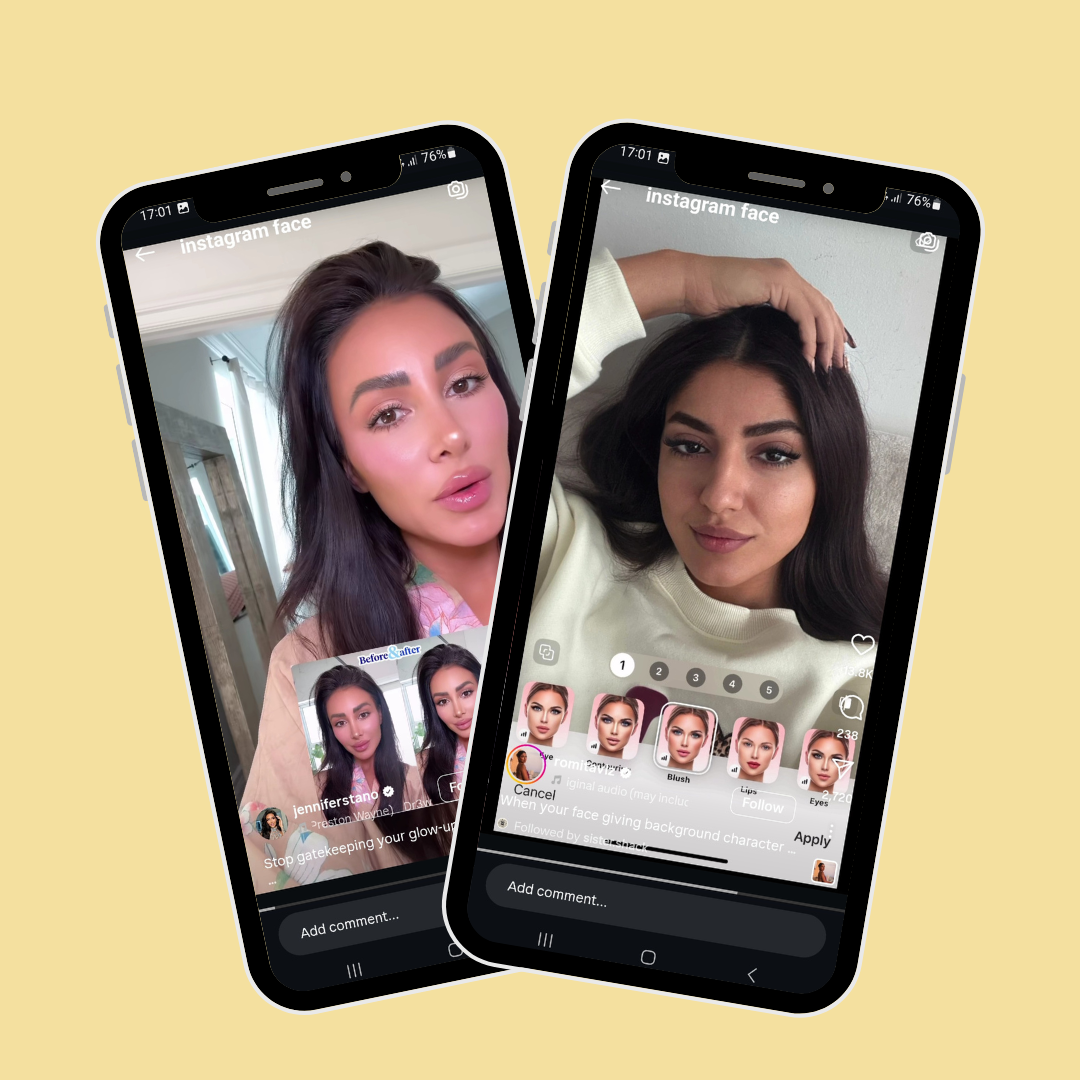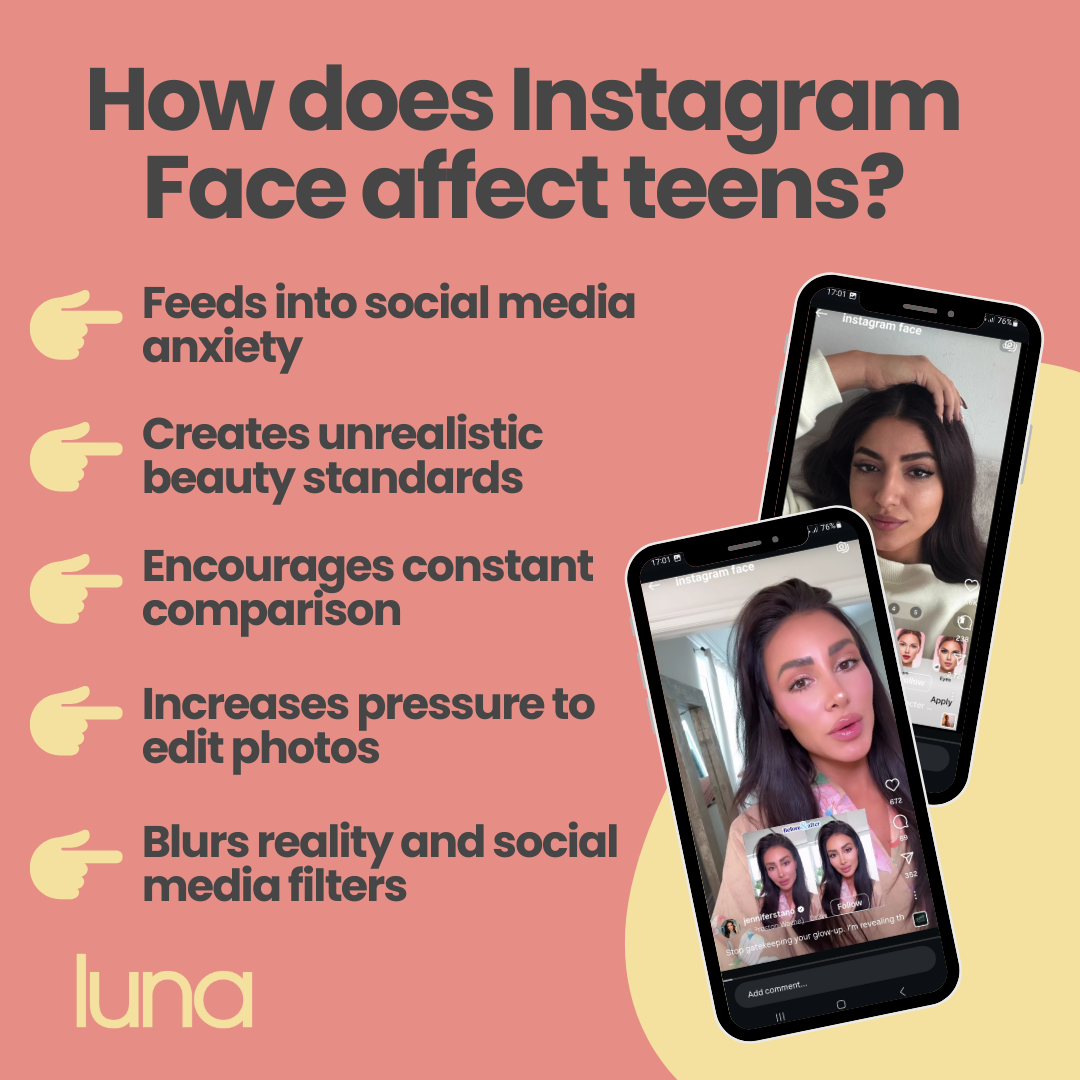How might Instagram Face be affecting teens?
Beauty filters and self-esteem

Updated December 2, 2025 • Medically reviewed by Dr. Emma Dickie
Medically reviewed by Dr. Emma DickieIn this article
Quick summary
- “Instagram Face” describes a filtered, flawless look popularised by beauty filters and influencers online
- For many teens, this constant exposure can impact confidence and body image
- Parents can help by talking openly about filters, encouraging authenticity, and promoting self-confidence – tools like luna can also help with this

If you’ve spent any time scrolling through Instagram or TikTok, you’ve probably seen it.
Smooth skin, big eyes, a tiny nose, sharp cheekbones, full lips.
That’s what people are calling Instagram Face.
It’s a kind of “digital beauty ideal” that’s become almost impossible to avoid.
The look started with photo filters and editing apps, and progressed into more permanent changes like filters and surgery. It's become so common that it’s hard to tell what’s real and what’s not.
For teens, who are still figuring out their own identity and self-image, this can quietly shape how they think they should look, even when they know it’s not reality.
What is Instagram Face?
Instagram Face is a beauty standard that uses filters and editing apps to achieve a specific look characterised by large lips, almond-shaped eyes, and flawless skin.
This has also translated more recently into real-life changes, such as botox, fillers and surgery.
The problem isn’t that any of these traits are bad on their own.
It’s that they’ve become the default beauty standard online.
Every filter, ad, and influencer post seems to reinforce the same image.
For teens who are still learning to love their real faces, that can be confusing.
Many start using filters to match that look, not realising how normal and beautiful their natural, unique features already are.
This “one-size-fits-all” beauty ideal can make individuality, such as freckles, acne, or asymmetry, feel like something to hide instead of something to celebrate.
Does Instagram Face affect self-esteem?

When teens see hundreds of versions of this same “perfect” face every day, it’s easy to start comparing.
Even when they know it’s filtered, it can make them question their own appearance.
Some teens will start to feel as if they can’t post their true selves on social media, as they may not believe their face is Instagram worthy.
A recent luna poll found that over half of teen girls (54%) say they edit or filter their appearance at least sometimes before posting online.
But the pressure doesn’t stop when they put their phone down.
Constant exposure to this idealised look can make everyday things, like taking a school photo, joining a video call, or going out without makeup, feel uncomfortable or even stressful.
Over time, this can chip away at self-confidence, making it harder for teens to feel comfortable in their own skin, both online and off.
Social media can be both inspiring and overwhelming.
Teens use it to connect, explore, and express themselves, but it’s also where they’re most likely to compare their bodies and faces to others.
When every scroll shows “highlight reels” and perfect photos, it can distort what’s normal.
That constant comparison can lead to self-doubt, frustration, or a feeling of never being “enough.”
Here’s how social media can affect body image in teens:
- Comparison culture: teens often compare their looks, weight, and lifestyle to influencers or peers online
- Unrealistic beauty standards: filters and editing apps create images that are impossible to live up to in real life
- Validation through likes: when self-worth becomes tied to likes and comments, it can chip away at confidence
- Body checking: constantly looking at their own image or others’ posts can increase body dissatisfaction
But here’s the hopeful part: not all online spaces are negative.
There’s a growing wave of body positivity and authenticity on platforms like TikTok and Instagram, and luna (NOT a social media app) is also there to promote this message, without any peer to peer interaction.
Many teens now follow creators who celebrate real skin, diverse body types, and unfiltered photos, and that’s helping shift the narrative toward self-acceptance.
Encouraging your teen to follow those creators (and maybe unfollow ones who make them feel bad) can make a real difference.

How parents can help
You don’t need to know every TikTok trend or Instagram influencer to make a difference.
What matters most is how you talk about it with your teen.
Here are a few ideas to support your teen:
- Talk about what’s real: show them examples of edited vs. unedited photos and talk about the difference
- Remind them about perspective: remind them that most people post their best angles and moments online, not the full story
- Encourage breaks: a few days off social media can do wonders for perspective and self-esteem
- Model kindness toward yourself: teens learn how to talk to themselves by hearing how we talk about ourselves
These small actions help your teen build a stronger sense of self. One that isn’t swayed by filters or trends.
Keeping the conversation real
The truth is, Instagram Face isn’t going away anytime soon, but awareness is power.
When teens understand what’s behind these digital beauty ideals, they’re less likely to be defined by them.
What really helps is keeping the conversation open, curious, and judgment-free.
Ask what they think about filters or influencers, how certain posts make them feel, or if they’ve ever felt pressure to edit photos.
When you listen first and advise second, you help your teen feel seen, understood, and confident in who they already are, no filters required.
And if you ever feel like your message isn't coming across, send them to luna! On our app, we have a category that's dedicated to promoting positive body image, and reinforcing the message that social media is not real. It's a safe space where your teen can learn what it really means to be a teen.

How we created this article:
luna's team of experts comprises GPs, Dermatologists, Safeguarding Leads and Junior Doctors as well as Medical Students with specialised interests in paediatric care, mental health and gynaecology. All articles are created by experts, and reviewed by a member of luna's senior review team.
Sources:
Cleveland Clinic "Social media and body image" | Accessed 13.11.25
https://health.clevelandclinic.org/social-media-and-body-imageWe'd love to keep in touch!
Sign up to our parent newsletter for emails on the latest teen trends, insights into our luna community and to keep up to date
By signing up, you are agreeing that we can use your email address to market to you. You can unsubscribe from marketing emails at any time by using the link in our emails. For more information, please review our privacy statement.